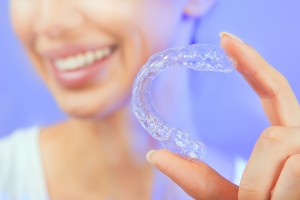bruxism

Invisalign and Bruxism If you’ve considered braces over the past several years, chances are you’ve been introduced to Invisalign – an alternative to braces that uses clear plastic aligners to straighten teeth. These aligners are nearly invisible to the naked eye, can be removed to eat and drink, and are considered more comfortable in the mouth than traditional metal braces. However, Invisalign is not right for everyone, and for those that struggle with severe teeth clenching and grinding, it may be a good idea to consider an alternative treatment for straighter teeth. Why Avoid Invisalign? One of Invisalign’s greatest strengths

Invisalign and Bruxism If you’ve considered braces over the past several years, chances are you’ve been introduced to Invisalign – an alternative to braces that uses clear plastic aligners to straighten teeth. These aligners are nearly invisible to the naked eye, can be removed to eat and drink, and are considered more comfortable in the mouth than traditional metal braces. However, Invisalign is not right for everyone, and for those that struggle with severe teeth clenching and grinding, it may be a good idea to consider an alternative treatment for straighter teeth. Why Avoid Invisalign? One of Invisalign’s greatest strengths
Teeth grinding is not always a cause for concern. However, if you find that you grind your teeth at night to the point of causing pain or damaging your teeth, you’re likely dealing with bruxism. Bruxism is the habitual and unconscious grinding or clenching of your teeth. Bruxism tends to occur at night while sleeping and can be caused by a variety of different issues, including stress or misalignment of teeth. Treatments for Bruxism If you have been diagnosed with bruxism, there are several orthodontic treatments that can help. The following are some of the most common orthodontic treatments for
We all clench our teeth from time to time. Grinding and clenching occasionally are not considered a health issue. However, there is a medical condition for those that clench their teeth frequently, known as “Bruxism,” and those that suffer from Bruxism may be causing issues that contribute to a problems with their teeth and a lower quality of life. Bruxism is the habitual clenching, grinding, or gnashing of teeth together. It’s worse at night for most sufferers and can sometimes be indicative of a larger problem, like anxiety, sleep apnea, or chronic sinus conditions. If you believe you may suffer
